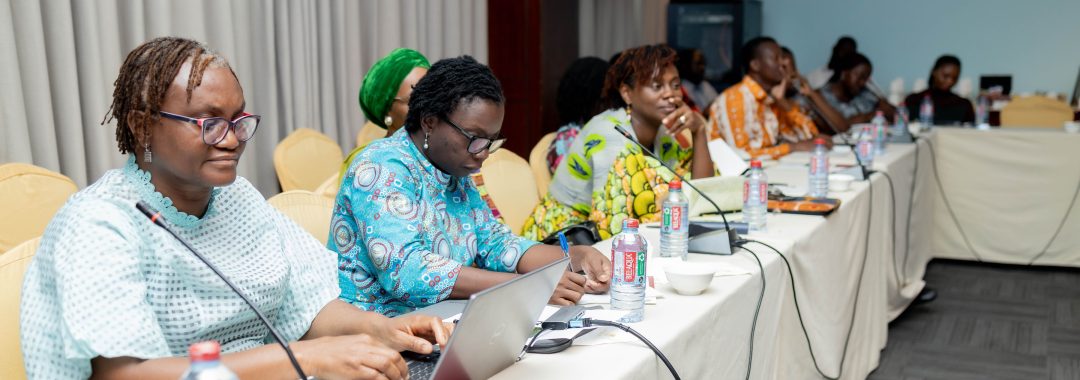In the bustling markets, quiet villages, and even in the air-conditioned office spaces where the click of heels echoes against polished tiled floors, countless Ghanaian women wake up before dawn, balancing the demands of their families with the need to earn a livelihood. They are traders, farmers, caregivers, and professionals, contributing significantly to the nation’s economy, yet often receiving little in return for their tireless efforts. These daily struggles highlight a stark reality: despite their vital roles, many of these women face significant economic inequalities, struggling to receive fair compensation for their labour and talents.
Recognising these disparities, the “Promoting Effective Policies for Women’s Economic Empowerment” (WEE-Ghana) project represents a holistic approach to changing the economic fortunes of the average Ghanaian woman for the better. By fostering gender-sensitive policy-making, through strategic collaboration, WEE-Ghana aims to bridge the gap between women’s contributions and their compensation, ensuring they receive the recognition and financial stability they deserve.
In a significant step towards this mission, WEE-Ghana recently convened two essential stakeholder meetings at the Tang Palace Hotel in Accra.
Dialoguing with women professionals

WEE-Ghana project team and Executive Women Network members’ lunch engagement
The first, which occurred on June 11, 2024, saw the project team engaging with key members of the Executive Women’s Network (EWN), to explore actionable strategies for influencing gender-sensitive policy-making.
In a brief overview, a Co-Principal Investigator, and Associate Professor of Sociology at the University of Ghana, Professor Akosua Darkwah highlighted how literature evidenced the ways in which government’s policies could have unintended negative and positive consequences for women’s economic empowerment. She shed light on several such examples, noting how gender-sensitive policy actions were key to addressing the issue.
Mapping out the specific actions to achieve the project’s goal, she stated, “What we want to do over the next three years is focus on six policies, beginning with an analysis of existing government policies to identify how they can be amended to support women’s economic empowerment. We would then review literature to determine what exists in the larger body of work on these issues, then we will go out next year to do a number of case-studies. This will provide us with real-life stories about the way the different policies either make or unmake women in terms of their economic circumstances.”
The final year, she stated, would be dedicated to dissemination of the findings through academic journals, films, traditional and social media, as well as other formats.
“This is important to enable the average Ghanaian gain an awareness of what the entire intervention is about,” she added.
Professor Darkwah disclosed that the project was keen on partnering with policy-makers, researchers, and women’s groups, out of which, the EWN and the Network for Women’s Rights (NETRIGHT) had been identified as key.
Expressing her enthusiasm towards contributing to the joint endeavour, the Chairperson of the EWN Executive Committee, Madam Janet Sunkwa-Mills, noted, “Leveraging the diverse membership and expertise-base of our Network, coupled with your advocacy from above, and below strategy, are novel approaches, to assisting to create a critical mass of economically empowered Ghanaian women through gender-responsive policy making. “
Engaging with the policy-makers

Participants at the policy-makers’ dialogue
In a related development, the WEE-Ghana project team, dialogued with key policy-making institutions whose work directly aligned with the project’s focal policy areas.
The event which was held on June 12, 2024, brought together, upper-level policy-makers from the financial, labour and employment, agriculture, communication, and care sectors.
Critical insights emerged from the engagement, which aimed amongst others, to gain an understanding of the nature of policymaking in Ghana, as well as discuss the possibilities for alternative policy-making models that were gender-sensitive. Of noteworthiness was the need for the project to include parliamentarians, and women in politics as critical stakeholder groups for the achievement of its goal. The policy-makers, also identified well-structured and holistic capacity-building, as central to boosting their skills in formulating gender-responsive policies.
Building a network of policymakers sensitive to the gendered impact of policies, and dedicated to the development and implementation of gender-responsive policies for women’s economic empowerment, is a major outcome the WEE-Ghana project articulates. The two-day meeting marks the first of six convenings planned over the lifetime of the project.
How you can support our mission
The journey to economic equality and empowerment for Ghanaian women is a collective effort. We invite you to be a part of this transformative mission. Follow our progress, share your insights, and support our initiatives by visiting our website and connecting with us on social media. Together, we can bridge the gap and ensure that every Ghanaian woman receives the recognition and financial stability she deserves. Stay informed, get involved, and make a difference with WEE-Ghana.
Follow us on social media:

